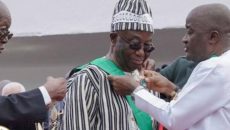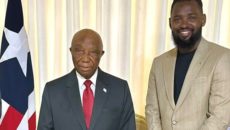He describes himself as a race car that has been kept in a garage for 12 years, waiting to be set on the track to unleash a wave of change in Liberia.
But there are many reasons why Liberians should be wary of voting for Vice President Joseph Boakai to take over as the country’s next president.
For one, Boakai’s actions during the campaign season are showing that he has no willingness to tackle issues that Liberians repeatedly raise as important to them: government waste, corruption, and abuse of government resources.
Anyone voting for Boakai should not expect him to reduce these vices. While Boakai’s campaign has been touting him as someone who has never been accused of corruption in his 40 or so years of public service, he has shown a willingness to either allow or push for the unethical and in some cases, illegal use of government resources for his campaign.
During this campaign season, his campaign was known to disrupt children’s education by letting them out of school to attend his campaign events. Moreover, coverage on the state broadcaster, ELBC Radio, has been overwhelmingly tilted in his favor. This is especially noticeable when you compare the biased language and the length of time allocated to his campaign launch with other parties’ launch.
Additionally, there have been reports of chiefs and other employees of the Ministry of Internal Affairs being pressured to publicly support Boakai.
These scenarios are not the only indication that Boakai does not plan to tackle misuse of government resources. He even said it during one of the debates.
When he was asked if he would commit to reducing excessive salaries throughout the government, the vice president made it clear that he approves of government waste as a means of ensuring that top government officials can retire with comfort.
While he said he is not against salary reduction, he emphasized the need “to protect those who are working as well.â€
“If you have a government that plans for people – when they leave job, that they can have a future – it’s another way to be able to manage the economy,†he said. “Let’s be sure that there’s a future for people when they leave government.â€
It is no surprise, then, that at least 50 senators and representatives (who receive salaries and benefits equivalent to their U.S. counterparts) support Boakai’s presidential bid. That mass endorsement should be concerning to anyone who wants a president who will reduce corruption, as the legislative branch has successfully managed to brand itself as the most corrupt and least monitored government branch.
The issue of unnecessarily high salaries is not the only thing that frustrates Liberians; they’ve also had a problem with nepotism. When asked during a debate about whether he would allow nepotism to continue under his watch, Boakai essentially said he has no problem with it.
“I cannot stop my children from working for their country,†he said, before adding a qualifier. “If the only reason is you got a job because you’re my son, that’s not a good reason.â€
But having unqualified people in office is not the only problem with nepotism. In government, nepotism is also considered unwelcome because it creates a conflict of interest. A president appointing a child has long been accustomed to protecting and acting in that child’s best interest. But if there is a case of impropriety or corruption, the president is now also expected to act in the citizens’ best interest.
After all, even the biggest critics of President Ellen Johnson Sirleaf’s appointing her sons to prominent positions within her government did not cite her sons’ qualifications as the main reason for their oppositions.
It comes as no surprise then, that her son Fumba Sirleaf, who was implicated in the Global Witness corruption scandal, was one of the few who did not receive a day in court. Additionally, after the numerous fiascos with the National Oil Company of Liberia, Robert Sirleaf continues to walk free.
Boakai answer to the nepotism question further suggests his ignorance of or his willingness to break the law. After all, the Code of Conduct prohibits nepotism.
Put aside the penchant for abusing government resources and allowing a practice of unreasonably high salaries to continue. Boakai’s most surprising weakness, perhaps, is that for someone who has been in the public sector for so long, he has quite an underwhelming list of achievements, many of which are not well known.
Even if we agree with Boakai’s statement that he was not given the latitude to do much while he was vice president, we don’t have a clear idea of what he did in his decades of government service before he became vice president.
On his campaign website, 57 achievements are listed, but at least 23 of these items are counting meetings he held, speeches he has made, or ideas he subscribes to as achievements. For example, “He believes in Rural Banking†is included as an accomplishment.
What would appear to be the most significant achievement reads:
“In the 1980s when he served as minister of agriculture, 70 percent of the rice on the local market was produced in Liberia and thirty percent was imported into Liberia.â€
But this statement is careful not to attribute this achievement to Boakai. Note that it does not say that Boakai’s policies as minister of agriculture pushed the percent of rice produced in Liberia to be 70. Of course, it would not, because Boakai was agriculture minister for no more than two years. Additionally, for much of that decade, Liberia imported no more than 30 percent of the rice on the local market.
It’s clear that Boakai, in his decades of public service, has not had significant achievements that he can sell to the Liberian people.
One of the vice president’s competitors, Alexander Cummings, likes to say, “The best predictor of future performance and behavior is past performance and behavior.†Why should the Liberian people believe that Boakai will suddenly be able to deliver after decades of failing to do so?
However, while the need for a president with a track record of accomplishments, who prioritizes cutting government waste and corruption are all important, they pale in comparison to the simple fact that if Liberians give the country to Unity Party for six more years, it could take significantly long before any other party gets it back.
During this campaign season, Unity Party has already shown the willingness to illegally use government resources to gain an advantage. If Liberians decide to vote Boakai in as president, it could be the beginning of something similar to the True Whig Party hegemony.
The future of the republic is at stake.
Featured photo by IMF Staff Photo/Stephen Jaffe



